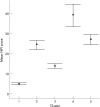Neuropsychiatric symptoms in patients with Parkinson's disease and dementia: frequency, profile and associated care giver stress
- PMID: 16820421
- PMCID: PMC2117797
- DOI: 10.1136/jnnp.2005.083113
Neuropsychiatric symptoms in patients with Parkinson's disease and dementia: frequency, profile and associated care giver stress
Abstract
Objective: To explore the profile of neuropsychiatric symptoms in patients with dementia associated with Parkinson's disease (PDD).
Methods: 537 patients with PDD drawn from an international multicentre clinical trial of rivastigmine were assessed using the 10-item Neuropsychiatric Inventory (NPI). A cluster analysis was used to investigate the inter-relationship of NPI items. Associations between the clusters and demographic and clinical variables were analysed.
Results: 89% of the patients presented at least one symptom on the NPI, 77% had two or more symptoms and 64% had at least one symptom with a score > or = 4. The most common symptoms were depression (58%), apathy (54%), anxiety (49%) and hallucinations (44%). Patients with more severe dementia and advanced Parkinson's disease had more neuropsychiatric symptoms. Nearly 60% of the care givers reported at least one NPI symptom to be of at least moderate severe distress. Five NPI clusters were identified: one group with few and mild symptoms (52%); a mood cluster (11%, high scores on depression, anxiety and apathy); apathy (24%; high apathy and low scores on other items); agitation (5%, high score on agitation and high total NPI score); and a psychosis cluster (8%; high scores on delusions and hallucinations). The psychosis and agitation clusters had the lowest Mini-Mental State Examination score and the highest Unified Parkinson's Disease Rating Scale and care giver distress scores.
Conclusion: Neuropsychiatric symptoms are common in patients with PDD. The profile of these symptoms differs from that in other types of dementia. Subgroups with different neuropsychiatric profiles were identified. These subgroups may be associated with distinct neurobiological changes, which should be explored in future studies.
Conflict of interest statement
Competing interests: None declared.
Comment in
-
Behavioural and psychological symptoms of dementia associated with Parkinson's disease.J Neurol Neurosurg Psychiatry. 2007 Jan;78(1):2-3. doi: 10.1136/jnnp.2006.101162. Epub 2006 Sep 5. J Neurol Neurosurg Psychiatry. 2007. PMID: 16954135 Free PMC article.
References
-
- Brown R G, MacCarthy B. Psychiatric morbidity in patients with Parkinson's disease. Psychol Med 19902077–87. - PubMed
Publication types
MeSH terms
LinkOut - more resources
Full Text Sources
Other Literature Sources
Medical





